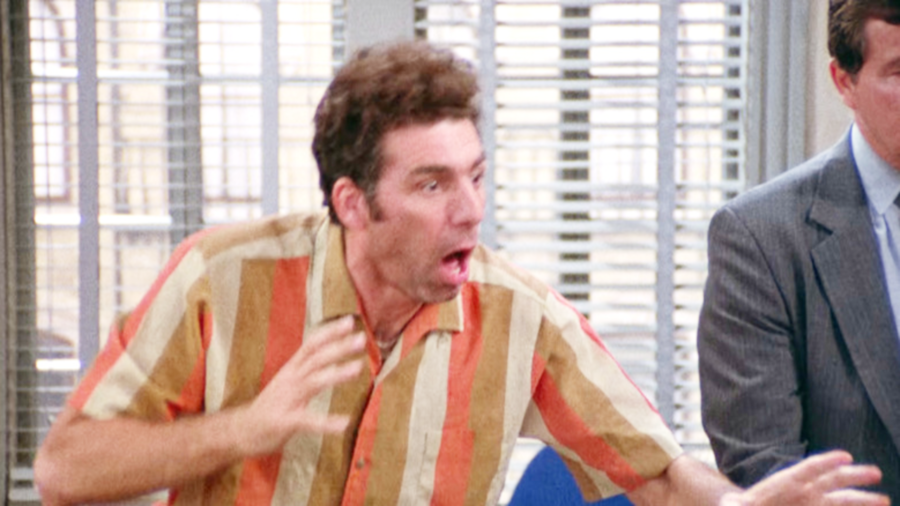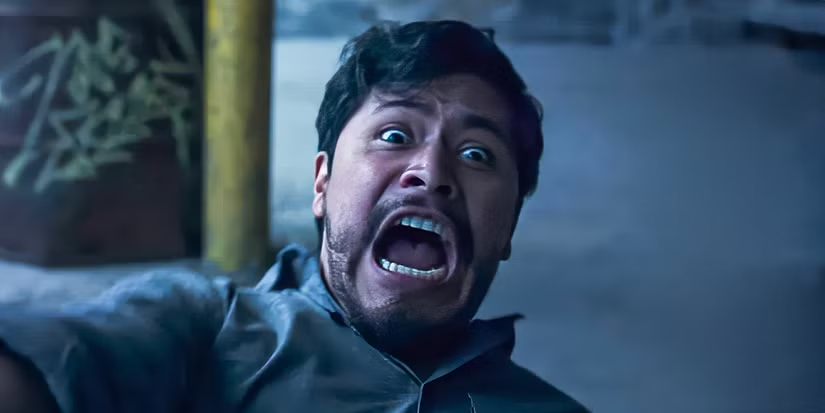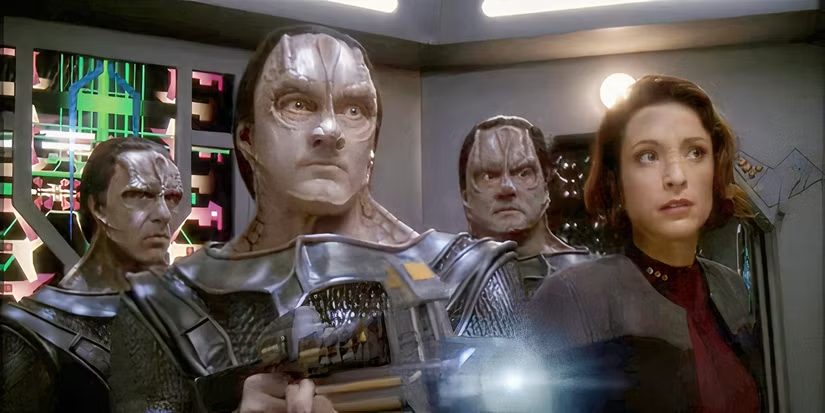Entertainment
The Seinfeld Episode So Controversial It Was Never Filmed

By Robert Scucci
| Published

Self-censoring in the name of self-preservation is often seen as a sign of weakness, but sometimes it’s a necessary evil, especially when it comes to network television. What might sound like a great idea in the writers room can quickly turn into a liability once it’s read out loud, and the cast and crew of Seinfeld knew they were flirting with trouble if they ever greenlit “The Bet,” a Season 2 episode that was scrapped before entering active production because of its controversial approach to gun violence.
In this case, completely nixing the episode during a table read wasn’t the result of an overbearing standards and practices board stepping in at the last minute. It was the Seinfeld cast itself deciding that the entire episode crossed a line and felt wrong.

Written by Larry Charles, who remained with Seinfeld through Season 6, “The Bet” never fully materialized and was ultimately replaced by “The Phone Message,” which Jerry Seinfeld and Larry David famously wrote in just two days to make sure an episode still made it to air. Ironically, “The Phone Message,” despite its critical praise, was a ratings failure and ended up putting the show on a two-month hiatus anyway.
Had “The Bet” been fully realized, any backlash could have very well killed the show outright. Seinfeld didn’t truly find its footing until Season 3, and at that early stage, the margin for error was razor thin.
“The Bet” Broken Down

Reading the synopsis today, the scrapped episode’s premise doesn’t sound especially outrageous on paper. The structure follows the familiar A and B story format most sitcoms rely on, but the A story is where things went off the rails. Elaine deciding she wants to buy a gun is what made everyone involved reconsider filming the episode. Larry Charles, who worked on the series through Season 6, wrote the script with the intention of pushing Seinfeld into darker territory.
The B story involves a bet between George and Jerry over whether Kramer hooked up with a flight attendant while traveling to Puerto Rico, and it’s all fairly standard stuff. There’s no controversy there, just classic Seinfeld material that feels perfectly in line with the show’s usual rhythm.

During the table read, Julia Louis-Dreyfus recoiled when she got to one scene in particular. In it, Elaine holds a gun, to be purchased with Kramer’s help, to her own head and asks Jerry, “Where do you want it, Jerry? The Kennedy? Or The McKinley?” while pointing the gun at her head and stomach, respectively.
Louis-Dreyfus immediately voiced her concerns to Jason Alexander and Tom Cherones, who were slated to co-direct the episode. After talking it through, they all agreed the plot line pushed things far past the point of discomfort. The episode was shelved indefinitely, and with the show needing to go on, Jerry Seinfeld and Larry David got to work writing a replacement.
An Appropriate Amount Of Restraint

While I don’t generally agree with censorship for its own sake, I side with the Seinfeld camp for shelving “The Bet” before it caused real damage to the series. Today, it’s easy to forget just how fragile the show was early on. We now recognize Seinfeld as the cultural juggernaut it became, but that success was anything but guaranteed at the time of the initial table read.
The series limped through its first two seasons, which would be unheard of by today’s standards. NBC saw potential and allowed it to continue far longer than most new shows would ever be given now. At such a critical moment in its run, shelving an episode that could have alienated audiences was a smart move. It saved the show from shooting itself in the foot, pun fully intended.

Seinfeld writer Larry Charles has since admitted that he pushed the premise too far, and he’s never expressed any bitterness over the decision. It’s hard to imagine he would have continued working on the show if there had been lingering resentment. He has gone on record saying the idea likely would have been better received in a later season, once Seinfeld became a household name and had the clout to get away with more controversial episodes like “The Contest.”
The Funny Has To Outweight The Controversy
Following one of comedy’s oldest rules, Charles loved the darker elements of “The Bet,” but acknowledged that if you’re going to lean that hard into discomfort, the material needs to be disproportionately funny. By his own admission, it simply wasn’t. That’s the measuring stick all comedy lives and dies by. Shock value on its own almost always earns mixed reactions unless it’s paired with something genuinely hilarious.

Ironically enough, Jerry actually gets gunned down in exaggerated fashion when he imagines the consequences of stealing cable in a later Season 2 episode, “The Baby Shower,” which only reinforces the point. It’s a self-contained sequence of imagined violence that exists entirely within the show’s heightened reality and plays as absurd rather than provocative. That kind of cartoon logic is a far cry from Elaine making light of assassinated presidents, which would have put the show under far harsher scrutiny.
“The Bet” was written with the wrong voice at the wrong time. Had Seinfeld been a runaway success from the start, it might have gone down as a daring classic. Instead, it stood a real chance of killing the show before it ever had the opportunity to become what we now remember it as. In the end, everyone involved arrived at the same conclusion organically, without a top-down mandate telling them to pull the plug.

Seinfeld is streaming on Netflix.
Entertainment
Senator Mitch McConnell, 83, Hospitalized With Flu-Like Symptoms
Kentucky Senator Mitch McConnell was admitted into the hospital after suffering “flu-like symptoms” over the weekend.
According to a statement provided to People by a representative for McConnell, 83, on Tuesday, February 3, the longest serving Senate party leader in U.S. history checked himself into a hospital one day prior.
“In an abundance of caution, after experiencing flu-like symptoms over the weekend, Senator McConnell checked himself into a local hospital for evaluation last night,” the statement read.
The Kentucky Republican’s statement also noted that his prognosis is “positive” and he is receiving “excellent care.”
It concluded, “He is in regular contact with his staff and looks forward to returning to Senate business.”
It is unclear how long McConnell is expected to remain in the hospital.
Us Weekly has reached out to a representative for McConnell for comment.
The politician has publicly shared his health issues over the years, while a recent fall that took place in the hallway of the Capitol Building in Washington, D.C., was witnessed and filmed by reporters.
Shared by local Louisville, Kentucky, news outlet WHAS11, via its YouTube account on October 17, 2025, a video of the incident also captured McConnell walking while assisted by the arm of a colleague just prior to his fall.
The tumble occurred while McConnell was being questioned over his perspective on Immigration and Customs Enforcement (ICE).
His Capitol Building fall marked the third public fall of 2025, and the politician has publicly fallen twice in the building in total.
McConnell also suffered a public concussion after tripping and falling inside Washington’s Waldorf Astoria in 2023. His recovery involved reliance on a wheelchair, per reporting at the time by NBC News.
He has also demonstrated public freezing episodes over the years, several of which were captured by news outlets during press conferences. The results of the episodes have left McConnell completely non-responsive in the face of questioning.
McConnell has held the seat of Kentucky since 1985 and is currently in his seventh Senate term. From 2007 to 2025, he also served as the leader of the Senate Republican Conference. He announced last year that he would not seek reelection in 2026.
In 2015, McConnell, who has been married to former government official Elaine Chao since 1993, was first listed as one of Time magazine’s 100 most influential people in the world. He was awarded the same honor in 2019 and 2023.
He is a polio survivor, having endured a polio attack in 1944 when he was two years old. His upper left leg was paralyzed as a result of the attack. Successful treatment from medical staff at the Roosevelt Warm Springs Institution for Rehabilitation at the time, prevented McConnell from developing a permanent disability.
Entertainment
One of the Most Remarkable Movies Ever Made About Space Is Now Available To Watch on Netflix

Space travel has been a subject that has long fascinated filmmakers, as the silent classic A Trip To The Moon was one of the earliest examples of cinema predicting real events. Although the science fiction genre has frequently speculated about the possibilities of space travel, the 1969 NASA lunar mission visualized what it would actually look like, leading to an even greater expansion in imagination. Although it is one of the most important historical moments of its century, the NASA space trip to the lunar surface was not fully realized on film until the 2019 documentary Apollo 11, which assembled previously unseen footage to explore every step of the journey. It’s not only one of the most brilliantly crafted documentaries of the 2010s, but an important work of historical documentation that serves as a reminder of what technological advancements have achieved.
The footage of Neil Armstrong stepping onto the lunar surface is an undeniable part of popular culture, but the technology did not exist to distribute all the footage of the NASA mission in 1969, given the amount of material. It was only after director Todd Douglas Miller and his team of editors spent the time to search through hundreds of hours of both footage and audio experts that they were able to pinpoint the most important material needed to tell the story, all whilst polishing the quality to meet contemporary standards. The result is a documentary that has none of the hallmarks of the medium; Apollo 11 plays so seamlessly that someone with no knowledge of the situation could mistake it for an original piece of dramatic filmmaking.
‘Apollo 11’ Is Edited Like No Other Documentary
Apollo 11 is unique when compared to most documentaries because the film does not include any talking heads, introductory information, narration, or recreations that would break the momentum of the story. What’s being shown is taken from the original film negatives recorded during the original mission, which were only used as a matter of historical record. A majority of these videos were never displayed to the public, giving Apollo 11 the opportunity to blend in unseen aspects of history. The story of the mission itself is so filled with stakes that there was no need to provide any sort of additional drama. It was a sign of bravery on Miller’s part that he trusted the audience to have some degree of awareness of the situation, but it also doesn’t take a scientific expert to enjoy Apollo 11. Even for those who don’t know every step of NASA’s process or understand the different programs that are being cited, Apollo 11 provides a complete portrayal of the many different departments that played a role in the spectacular achievement.

One Of The Year’s Best and Most Overlooked Documentaries Just Landed on Hulu
A film more than worthy of your time.
Seeing the image crystalized in such vivid detail is almost jarring, as the imagery is so crisp that it nearly feels like the film is taking place in real time. Although Apollo 11 obviously did not show every step of the process, as the mission itself was preceded by years of research and testing, the film helps to contextualize the enormity of NASA’s achievement. Armstrong and Buzz Aldrin may have walked away with the most fame, but the scientists who planned the ordeal, the engineers watching the controls, and the journalists who helped to record the event all played a part in pulling off a groundbreaking leap forward for mankind. The focus on showing the team effort is not only an important theme to convey, but an explanation for something that otherwise might seem like science fiction.
‘Apollo 11’ Is an Important Historical Time Capsule
Apollo 11 was given a limited distribution in IMAX theaters, as the scope of the imagery was so detailed that it justified the extended format. Miller was precise in directing the story to show which details would be most important to highlight at given times; even if the process was filled with some slower moments, Apollo 11 is able to navigate between different players involved so that the pacing never came to a halt. There are also components of the film that were left out of most newsroom accounts at the time, including the manner in which NASA prepared for different potential outcomes. It’s easy to forget that the mission could have ended in tragedy, and that there was no guarantee that NASA had both conceived of any possible issues with the mission and properly prepared to deal with them.
Apollo 11 is as detailed of a historical encapsulation as historians could ask for, but it also shows the emotional effect that documentaries can have. No recreation would have the same impact of seeing the real reactions of everyone involved in Apollo 11, as the film does seem to celebrate a grandiose moment that expands beyond any one person, institution, or country. Interestingly, Apollo 11 came only a year after Damien Chazelle’s First Man dramatized Armstrong’s personal journey during the same period; the films serve as perfect companion pieces, as First Man is a creative version of the grounded facts that Apollo 11 brought to life. Nonetheless, Apollo 11 was such a laborious documentary to put together that it feels like an achievement in its own right, and one that benefits all involved. Not only should it serve as an inspiration for those interested in the science of space travel, but as an indication to aspiring filmmakers what the medium may be capable of.
Apollo 11 is now available to stream on Netflix in the U.S.

- Release Date
-
March 1, 2019
- Runtime
-
93 minutes
- Director
-
Todd Douglas Miller
Entertainment
You’re Missing Out on the Best Horror Film To Hit Netflix in a Long Time

To say that the Netflix catalog is a hit-or-miss situation is hardly controversial nowadays. As a matter of fact, the same statement can be made about almost all of our giant, non-curated streaming services. It isn’t that rare for amazing movies and TV shows to pop up on these platforms, but quite often they tend to get buried under piles of titles that range from okay at best to horrifyingly bad. If you’re a horror fan, for instance, you might have missed one of the coolest, scariest, most disturbing films to hit Netflix in quite some time, arguably one of the best to hit our screens this year. After all, to finally come across Luis Javier Henaine’s Disappear Completely, one has to dig deep — almost as deep as the movie’s main character in his search for a cure to the curse that threatens to turn him into a kind of living corpse, a karmic punishment for his own misdeeds as a photojournalist specialized in crime scenes.
After premiering in 2022 at Austin’s Fantastic Fest, Disappear Completely debuted on Netflix in April 2024. And while it made its way to the streamer’s Top 10 in its native Mexico, it has struggled to find an audience in other countries where it is readily available. It’s a pity: Henaine’s film has a 100% rating on Rotten Tomatoes, and it is indeed a gem that deserves to be seen. Why it has not conquered audiences worldwide is hard to say. Perhaps Netflix hasn’t marketed it enough, or maybe it’s something to do with that pesky one-inch-tall barrier of subtitles. After all, it isn’t rare for international films — particularly genre films — to be overlooked only to be, years later, included in lists of underrated projects.
What Is ‘Disappear Completely’ About?
As it is so new in the world of streaming, Disappear Completely still has a chance of being recognized in its time. The film, which relies more on psychological horror than on traditional jumpscares, is a character study surrounding a man’s relationship with his profession, and his family. The premise is creative and terrifying from the get-go: Santiago (Harold Torres), a photojournalist who sells pictures of crimes and accidents to tabloids, falls victim to a curse after shooting a particularly gruesome scene featuring a still living, but completely unresponsive politician partly devoured by rats. Unbeknownst to him, Santiago’s camera has captured the presence of a demonic entity that traps him in the same web as the senator (Juan Sahagun) he just photographed. Little by little, Santiago starts to lose all of his five senses.

The 25 Best Movies About Missing Persons, Ranked
These crime thrillers go above and beyond to tell their story.
As Santiago races against time to find a cure for his predicament, going from doctors to shamans to the very demon that has hexed him, his girlfriend, Marce (Tete Espinoza), faces troubles of her own. Pregnant with Santiago’s child, she wishes to have the baby and build a happy family. However, Santiago claims that they are not ready to have a child, and pressures her to have an abortion. This relationship with Marce and his unborn baby ends up being essential to how Santiago deals with his curse, being completely responsible for sealing his fate. By the end of the movie, just as he is about to lose the eyesight that is so dear to him, Santiago refuses to deliver his child’s life to the demon in exchange for everything he has lost and therefore becomes forever locked in a tomb made of his own flesh.Mixing an urban vibe with folk horror, Disappear Completely is a movie that dabbles in witchcraft, superstition, and politics, with the cursed senator having been victimized by a political rival. However, the focus of the plot is Santiago himself. The movie asks us to place ourselves in his shoes, forcing us to wonder what it would feel like to be in such a terrifying predicament. The final scenes make this invitation to identify with the main character all the more obvious: as Santiago is losing his sense of hearing, we can barely understand the sounds around him. Eventually, in the blink of an eye, the whole movie goes quiet. As he loses his sight, the image becomes blurry, until it… disappears completely. Seven long, despair-inducing seconds of dark screen stand between the last image of Marce calling Santiago’s name and the film’s end credits.
‘Disappear Completely’s Director Was Intentional About Creating a Personal Film
Director Luis Javier Henaine was intentional in creating an immersive, realistic experience for the audience while filming Disappear Completely, as he shared during an interview with Eye For Film. Rather than relying on jump scares or musical cues, he aimed to “make a more personal film with more down to earth issues,” while still balancing the element of witchcraft and folk horror. He said:
“Here in Mexico, witchcraft is something that people take very seriously and something very, very real for the majority of our population. And I like to reflect that in a way. So, all the time, I was trying to say, ‘Okay, this has to look real, this has to feel real, this has to be very realistic.’ And that’s how I tried to go throughout the whole film, with the production design and with the cinematography and with everything. Our references were real things, how people behave in these environments. . . ”
Placing the audience in Santiago’s shoes is one of the reasons Disappear Completely is so unnerving – it feels personal. At the heart of the film is Santiago’s struggles with being a potential father and a supportive partner for Marce. When reading the script, Henaine envisioned “a very immersive filmmaking style,” one that would make the audience active participants rather than passive observers of Santiago’s slow descent into a tomb of his own flesh. “I thought it would be great to just when, when he starts losing his sense of hearing, just play slowly with the whole film as well, make it subjective, put the audience in the character’s mind,” Henaine explained.
‘Disappear Completely’ Presents Photography as the Ultimate Horror
Disappear Completely presents us with a kind of horror that would be disturbing no matter who it befell. Still, when we take into consideration Santiago’s profession, the film gains additional layers. At the same time that Henaine and his fellow screenwriter Ricardo Aguado-Fentanes ask us to identify with Santiago in his plight, they also make it pretty clear that he is someone we should despise. Santiago is not a tabloid photographer because that’s the only job he can find. On the contrary, he seems to enjoy taking pictures of mangled bodies and even attempts to make it into a form of high art. The movie shows us that he has fun creating tasteless titles for the stories that will accompany his pictures, and right in the beginning we learn that he is trying to sell some of his photos to art galleries. This is, in itself, terrifying: in a way, the biggest horror in Disappear Completely is becoming the subject of one of Santiago’s photographs.
A Susan Sontag quote that opens the movie gives us the key to interpreting the story in this sense. “Photography converts the whole world into a cemetery. Photographers, wittingly or unwittingly, are the angels of death.” In Disappear Completely, a still picture is not just a tomb in a graveyard because it depicts someone who might already be dead, but because having your picture taken is already a kind of death. You become unmoving, unfeeling, blind, and deaf, all at once. You might say something, of course, in the sense that all works of art say something, but you will never again respond to any stimuli.
When he is cursed, Santiago is doomed to become one of his own photographs. His fate is, in a way, an ironic punishment: he has condemned so many dead people to a living death that he will, himself, become a tomb in the cemetery that is the entire world. Disappear Completely is definitely a movie with something to say, and it turns its eyes specifically to the art of creating images. To an extent, it is even fitting to watch Santiago’s downfall happen in a movie instead of, say, reading about it in a book, for the image is essential for us to understand what is happening to him. As we gaze at Santiago, we wonder if what is happening to him might one day happen to us as well. After all, in the age of smart phones and social media platforms where privacy goes to die, haven’t we all produced our own fair share of images that trap people in a single, unchangeable moment?
‘Disappear Completely’ Also Focuses on Santiago’s Relationship with His Unborn Child
But while photography, particularly Santiago’s kind of predatory photojournalism, and its meanings are at the center of Disappear Completely, Henaine and Aguado-Fentanes also go beyond the professional aspect of their protagonist. Well, in a way. Santiago’s relationship with Marce and their unborn child is marked by his career: it is because he hasn’t yet succeeded as a serious photographer that he believes it isn’t yet time for them to have a baby. When confronted with the opportunity to preserve the one sense that he needs for working in exchange for his child, though, Santiago chooses to let himself disappear completely.
Santiago sacrifices himself for his unborn child and, by extension, for the sake of Marce’s happiness. After all, she is the one who wants to have a child. But will Marce still want that baby now that her life has been upended so completely, now that she doesn’t have Santiago by her side anymore? What he does is completely remove himself from Marce’s life, thus leaving her alone to make a decision about her pregnancy and deal with the consequences. It is a selfish choice, but the reality is that there is no decision that Santiago could make that would not be selfish, as trading his baby’s life for his senses would prove tragic for both him and Marce. Either way, the demon forces Santiago to wallow in the selfishness that has ruined his life.
Disappear Completely ultimately wraps up with a fitting conclusion for Santiago. In his infinite suffering, he decides that the world would be a better place without him, for there is no answer that would satisfyingly end his suffering. He has already done too much to be forgiven. He’s already drowned in hubris, having been a man who mocked the death of others and who refused the happiness of the woman who lived with him. He turns the world into a cemetery and thus deserves to be buried alive. Is it a sad conclusion? You bet it is. But, quite often, the best horror stories have a tinge of tragedy to them.
‘Disappear Completely’ Is One of the Best Horror Movies to Hit Our Screens in 2024
With all of that in mind, it is no stretch to call Disappear Completely one of the best horror movies of 2024, despite having started its festival run all the way back in 2022. After all, what counts is when a movie is made available to general audiences, and, even in Mexico, Disappear Completely only managed to get itself a proper theatrical release in February of this year. And, well, considering how divisive the year has been for its horror releases, to watch a movie that isn’t particularly revolutionary, but that does the basics so well can feel like a breath of fresh air. Sure, movies like Longlegs and The Substance have won over hearts and minds all around the world, but they have garnered equally large legions of detractors. As for Disappear Completely; well, it’s not the kind of film that will change your conceptions about what horror can be, but it will definitely scare you and make you think about the themes being laid out on screen.
This should by no means be construed as negative criticism of the film. Simple and straightforward doesn’t mean mediocre. You don’t have to purport to change the genre to create something truly sublime. Sure, a The Bear-like meal at a Michelin-starred restaurant might be life-changing, but a good, old bowl of mac ‘n cheese can be just as tasty and satisfying. From Huesera: The Bone Woman to When Evil Lurks, Latin America has been producing some incredible horror films over this past decade, many of which are available on Prime Video, Netflix, and other streaming services. Thus, why stop at one amazing work of art? After you finish this beautiful, tragic, and terrifying film, take a few days to expand your spooky horizons. Results may vary, of course, but you certainly won’t regret such a rich meal.

- Release Date
-
February 29, 2024
- Runtime
-
106 Minutes
- Director
-
Luis Javier Henaine
- Writers
-
Ricardo Aguado-Fentanes, Luis Javier Henaine
Entertainment
Sherri Shepherd’s Daytime Time Talk Show Cancelled

Sherri Shepherd’s time as a daytime talk show host has officially come to an end. It was recently announced that her self-titled show “Sherri” has been cancelled after four seasons.
The news comes on the heels of another daytime talk show confirming the end of its run, as “The Kelly Clarkson Show” will also not return for additional seasons.
Article continues below advertisement
‘Sherri’ To End This Fall After Four Seasons

Per Variety, “Sherri” has been cancelled and will not continue following the conclusion of its current season, set to wrap up in the fall. Debmar-Mercury, which distributes the show through producer Lionsgate, issued a statement confirming the news.
“This decision is driven by the evolving daytime television landscape and does not reflect on the strength of the show, its production – which has found strong creative momentum this season – or the incredibly talented Sherri Shepherd,” Debmar-Mercury co-presidents Ira Bernstein and Mort Marcus via joint statement.
“We believe in this show and in Sherri and intend to explore alternatives for it on other platforms,” the statement continued.
Article continues below advertisement
” Sherri” premiered in fall 2022, initially taking over the time slot of the long-running “Wendy Williams Show,” which ended after 13 seasons due to the ongoing health and personal issues of the former talk show host.
Article continues below advertisement
Shepherd Previously Expressed Her Happiness About ‘Sherri’ Being Renewed

In March 2025, it was announced that “Sherri” had been renewed for a fourth season, and at the time, Shepherd shared her happiness at continuing.
“I don’t take it for granted that people welcome me into their homes daily,” Shepherd said, per Variety.
“I work so hard to bring escapism to viewers’ lives through joy, laughter, and inspiration, and I’m grateful that the audience has embraced what we do. I look forward to raising the bar and turning up the volume as we plan for our season four return,” she continued.
Article continues below advertisement
Sherri Shepherd Joins Kelly Clarkson As A Now-Former Talk Show Host

Speculation circulated for weeks that “The Kelly Clarkson Show” would end its seven-season run this year, and the news was confirmed on Monday, February 2.
According to Deadline, Clarkson’s contract was up at the end of the show’s current season. However, the recent personal issues she is dealing with are believed to have been the determining factor in her decision not to continue the show.
Last year, Clarkson’s ex-husband and the father of her children, Brandon Blackstock, died due to cancer in August 2025.
Clarkson issued a heartfelt goodbye via an official statement.
Article continues below advertisement
“There have been so many amazing moments and shows over these seven seasons. I am forever grateful and honored to have worked alongside the greatest band and crew you could hope for, all the talent and inspiring people who have shared their time and lives with us, all the fans who have supported our show, and to NBC,” her statement read in part.
“Because of all of that, this was not an easy decision, but this season will be my last hosting ‘The Kelly Clarkson Show.’ Stepping away from the daily schedule will allow me to prioritize my kids, which feels necessary and right for this next chapter of our lives,” Clarkson continued.
The singer ended her message, adding, “I want to thank y’all so much for allowing our show to be a part of your lives, and for believing in us and hanging with us for seven incredible years.”
Article continues below advertisement
Daytime Talk Show Ratings Are Down Across The Board

Although “The View” continues to maintain its long-standing number one ranking, daytime talk show ratings overall have continued a steep decline throughout the years, despite talk shows being led by big names such as Jennifer Hudson, Drew Barrymore, Tamron Hall, and the aforementioned Shepherd and Clarkson.
Per The Hollywood Reporter, “the marketplace for daytime talk shows (and frankly, TV talk shows in general) has deteriorated in recent years amid pay-TV declines, a challenging advertising environment and fierce competition from video podcasts on platforms like YouTube.”
Sherri Shepherd Has Other Things To Fall Back On

Before she entered the world of daytime TV courtesy of “The View,” she had a long career as a comedian and actress. Her prior path in Hollywood would be the most obvious way to continue her career.
Shepherd starred in a variety of television and film projects during both of her talk show stints, something she will likely continue now that “Sherri” has come to an end.
Entertainment
Lisa Rinna 'knew nothing' about Colton Underwood's past during “The Traitors”: 'He got what he asked for'
:max_bytes(150000):strip_icc():format(jpeg)/Lisa-Rinna-the-traitors426-020326-ab0225abf0974053b7e7038f9d0dc2a0.jpg)
“Listen, if you ask me to be a Housewife, I’m going to come at you however I’m going to come at you,” the “Real Housewives” alum tells EW.
Entertainment
Apple TV Doubles Down on Sci-Fi With Captivating 2026 Announcement

Apple TV has just blessed us with its 2026 slate — at least for the first half of the year — and it looks like we’ll be watching every minute of the day going by the boatload of prestige TV they just dropped, as the streamer plans to roll out new originals nearly every single week, mixing prestige drama, buzzy thrillers, returning fan favorites and limited series with big stars dipping their toes in the episodic water.
The big headline, of course, is the return of Ted Lasso for Season 4, but that’s just one piece of a lineup that also includes fresh seasons of Shrinking, For All Mankind, Sugar, and more. Add in new shows led by Elisabeth Moss, Kerry Washington, Amy Adams, Javier Bardem, and Anya Taylor-Joy, and Apple is clearly aiming for a “prestige TV every month” vibe. The full year’s breakdown of today’s announced series can be found below.
Apple TV’s 2026 Series Release Schedule
Ted Lasso is back — but with a twist. Season 4 sees Ted coaching a second-division women’s football team, which feels like exactly the kind of heart-forward, underdog energy the show thrives on. And of course, it’s Apple, the home of prestige science fiction, which can only mean one thing: sci-fi fans are eating well. For All Mankind keeps pushing deeper into space in Season 5, while Monarch: Legacy of Monsters expands the MonsterVerse with more Titan chaos. For the crime enthusiasts, prestige thrillers are everywhere. Imperfect Women (Elisabeth Moss, Kerry Washington), Cape Fear (Amy Adams, Javier Bardem), and Criminal Record Season 2 all lean into darker, character-driven mysteries.
And of course, don’t forget about the giggles too, because between Shrinking, Margo’s Got Money Troubles, and the very chaotic-sounding Maximum Pleasure Guaranteed, Apple is still delivering the laughs as regularly as the dystopia.
|
Series Title |
Season |
Premiere Date |
|---|---|---|
|
Shrinking |
Season 3 |
Now Streaming (2026) |
|
The Last Thing He Told Me |
Season 2 |
February 20, 2026 |
|
Season 2 |
February 27, 2026 |
|
|
Imperfect Women |
Limited Series |
March 18, 2026 |
|
Season 5 |
March 27, 2026 |
|
|
Your Friends & Neighbors |
Season 2 |
April 3, 2026 |
|
Margo’s Got Money Troubles |
Season 1 |
April 15, 2026 |
|
Criminal Record |
Season 2 |
April 22, 2026 |
|
Widow’s Bay |
Season 1 |
April 29, 2026 |
|
Maximum Pleasure Guaranteed |
Season 1 |
May 20, 2026 |
|
Cape Fear |
Season 1 |
June 5, 2026 |
|
Season 2 |
June 19, 2026 |
|
|
Lucky |
Limited Series |
July 15, 2026 |
|
Ted Lasso |
Season 4 |
Summer 2026 |
What Movies Are Coming to Apple TV in 2026?
Apple TV has also revealed an impressive lineup of films coming to the streamer this year, from Elizabeth Olsen‘s afterlife romance Eternity, premiering next weekend, and Ryan Reynolds‘ long-awaited Cold War movie coming this fall, to Keanu Reeves‘ latest comedy Outcome and John Cena‘s hotly anticipated Matchbox movie. See the streamer’s full movie slate below.
|
Movie Title |
Starring |
Release Date |
|---|---|---|
|
Eternity |
Elizabeth Olsen, Miles Teller, and Callum Turner |
February 13, 2026 |
|
Outcome |
Keanu Reeves, Cameron Diaz, and Matt Bomer |
April 10, 2026 |
|
The Dink |
Jake Johnson, Ed Harris, and Mary Steenburgen |
July 24, 2026 |
|
Mayday |
Ryan Reynolds, Kenneth Branagh, and Maria Bakalova |
September 4, 2026 |
|
Matchbox The Movie |
John Cena, Jessica Biel, and Danai Gurira |
October 9, 2026 |
|
Way of the Warrior Kid |
Chris Pratt, Linda Cardellini, and Jude Hill |
November 20, 2026 |
Stay tuned at Collider for more!

- Release Date
-
November 1, 2019
- Network
-
Apple TV
- Directors
-
Sergio Mimica-Gezzan, Andrew Stanton, Meera Menon, Dan Liu, Allen Coulter, Craig Zisk, Dennie Gordon, John Dahl, Lukas Ettlin, Wendey Stanzler, Seth Gordon, Sylvain White, Michael Morris, Maja Vrvilo, Sarah Boyd
- Writers
-
Ronald D. Moore, Matt Wolpert, Ben Nedivi, Bradley Thompson, David Weddle, Nichole Beattie, Joe Menosky
Entertainment
A Gripping Case Brings Morgan and Karadec Closer Than Ever

Editor’s Note: The following contains spoilers for High Potential Season 2, Episode 12.Last week’s episode of High Potential ended with Karadec (Daniel Sunjata) rekindling things with his ex-fiancée, Lucia (Susan Kelechi Watson). Despite supporting Karadec and encouraging him to try again with Lucia, Morgan (Kaitlin Olson) had a sad look on her face as she watched them leave together. This seemed to be a clear set-up for the beginning of a possible feelings realization arc for Morgan, and sure enough, this week’s episode takes this to the next level in the very best way.
This week’s episode sees Major Crimes investigating the murder of the wealthy founder of a wellness company. Meanwhile, Oz (Deniz Akdeniz) tries to get his father’s headstone ready in time for a planned memorial service. This is a strong and fast-paced episode throughout, and it benefits from giving focus to each of the characters, and in particular, giving Oz his first subplot that’s completely separate from a case. Best of all, the case puts Morgan and Karadec in what appears to be a near-death situation, and it brings them closer than ever.
In ‘High Potential’ Season 2, Episode 12, Major Crimes Investigates the Murder of a Man Trying to Live Forever
In Season 2, Episode 12, “The Faust and the Furious,” the Major Crimes team investigates the murder of Gabe Rafferty (Brad Raider), the founder of a wellness-focused technology company called Genegevity. Gabe was stabbed inside his house, but there’s no clear sign that somebody got through his very elaborate security system. Morgan and Karadec speak to Gabe’s assistant, Renata (Lyla Porter-Follows), who reveals that he shared his biodata with her through the Genegevity app. After Renata’s mom died, Gabe became a mentor to her and gave her a job. The goal of the company was to stop the aging process so that people could live forever, which started with the treatments that he was using on himself.
The investigation process takes Major Crimes to a number of people who would have had the motivation to kill Gabe. A woman named Siobhan McBriar (Hallie Samuels) was suing Gabe because Genegevity changed the ingredients in her vitamins without telling her, which disrupted her birth control and got her pregnant. Later, they learn that Gabe was embezzling money from Genegevity, and that he had cleverly found ways to make all of his employees blame each other for the company’s financial discrepancies. A message from Gabe beyond the grave assures his company that someone will be taking over for him soon if he’s ever killed. It turns out all of this money was going into creating a new robot version of Gabe that had all of his previous memories and knowledge uploaded.
Robot Gabe speaks to Morgan and Karadec and tells them that the Do Not Disturb system in Gabe’s house was adjusted by someone other than Gabe on the night of his death, making it turn on earlier than usual. Robot Gabe also gives them a list of people who had been threatening Gabe, then the robot is shut down and can no longer talk to them. Morgan and Karadec go to see Mika Aster (Brandon Engman), the founder of the tech start-up that created the robots. Gabe bought the company promising to keep Mika on, but then he pushed Mika out. Morgan and Karadec visit Gabe’s house and briefly get stuck in the room where he was killed. They realize that Gabe was locked in when the Do Not Disturb feature was turned on, and that the candles he lit in the room were laced with arsenic, so Gabe stabbed himself to die faster instead of slowly being poisoned.
The killer turns out to be Renata, who teamed up with Micah to kill Gabe, both for their own reasons. While Micah wanted revenge and his company back, Renata felt betrayed and hurt because Genegivity had originally been researching the genes responsible for her mother and sister’s cancer, which she also carries. When Micah went to confront Gabe about taking over his company, Renata learned that all the money for the research had gone into the robots instead. Renata ultimately confesses after Morgan and Karadec confront her, but she stands by what she did.
In ‘High Potential’ Season 2, Episode 12, Oz Tries To Get a Headstone for His Father’s Grave
It was revealed last season that Oz’s father had died the year before. In this episode, Oz’s family tries to have a belated memorial for him, because they’ve been waiting for his headstone to be ready for a long time. A few days before they’re supposed to have the memorial (after it’s already been moved twice), Oz learns that the headstone was never confirmed with the cemetery. Oz goes to see his mom (Jacqueline Antaramian), and she says she used his father’s life insurance money to pay for the headstone. The costs then piled up, and before she knew it, the money was gone, and there was still no headstone.
Oz is angry with his mom, and she has to call Daphne (Javicia Leslie) to check on him because he won’t take her calls after that. Selena (Judy Reyes) then calls Oz in for a meeting, and he tells her that his mom spent $20,000 on a headstone that is now stuck in a shipping facility. Selena says that the funeral home took advantage of Oz’s mom, but Oz blames himself for not being there for her during his grief. Selena relates to Oz by telling him about her mother’s death, then she encourages him to stop being so hard on himself. Selena steps in to call out the funeral home for its predatory practices, and Oz’s mother gets a full refund. Oz’s father’s grave finally gets a headstone, and they have a memorial service for him. Oz gives a touching eulogy where he comes to terms with his grief, and then he calls the Major Crimes team his family.
In ‘High Potential’ Season 2, Episode 12, a Perceived Near-Death Experience Brings Morgan and Karadec Together
Karadec and Lucia are still seeing each other after reconnecting last week, and they’re already getting serious again. The episode shows how Karadec’s job is no longer the obstacle in their relationship, and it seems to hint that Morgan will become a new obstacle. Morgan shows up to Karadec’s apartment to ask for a ride to work, where she sees Lucia. In the car, Morgan asks Karadec about his relationship, and he tells her that he’s happy.
Later, Morgan and Karadec are investigating Gabe’s house, when they get locked in the room where Gabe was killed, and they believe that the room is filled with the poison that killed Gabe. Morgan has a panic attack, terrified that she doesn’t know what to do, and that there is no way out. She tries to do a grounding exercise, but her mind is full of images of the people she loves the most and will lose if they both die there: her three kids and Karadec. Karadec hugs Morgan to calm her down, and then the door opens, and it’s revealed that there was no poison in the room. It’s one of Morgan and Karadec’s best moments yet, because, on this rare occasion where Morgan feels a loss of control, Karadec is the one who’s able to keep her grounded.
When he gets home from work, Karadec has a conversation with Lucia where they talk about their past breakup and start to move forward together. It’s clear that Karadec has learned his lesson from their breakup, but he also already clearly has feelings for Morgan, even if he doesn’t realize it. After Oz’s father’s memorial, Morgan and Karadec talk about what happened. She feels mortified and ashamed about falling apart instead of being able to help out in that situation, but Karadec tells her that they count on each other, and that she would’ve done the same for him. The show then sets up an upcoming breakdown for Karadec. He tells her that at some point he will have a moment like she did, and that he knows that out of everyone in his life, she’ll be the person who will know how to get him through it. The episode makes it clearer than ever that Morgan will be the obstacle in Karadec’s relationship with Lucia this time around, and based on his facial expression after that last conversation, he may know it, too.
High Potential airs Tuesdays at 9:00 P.M. EST on ABC.

- Release Date
-
September 17, 2024
- Showrunner
-
Todd Harthan
- This episode puts Morgan and Karadec in a suspenseful near-death situation, in what is a phenomenal scene, with excellent acting from both Olson and Sunjata.
- This episode gives Oz his first big storyline outside of work, making the ensemble cast feel more balanced.
Entertainment
Deep Space Nine’ Such a Sharp Spin-Off

When Episode 22 of Star Trek: Deep Space Nine Season 7 arrives, the series is four episodes away from closing the figurative book on Star Trek‘s most artistically risky and exquisitely crafted piece of long-form storytelling to date. A major contributor to that success, franchise mainstay Ronald D. Moore, turns his screenwriting pen upon the audacious spin-off two more times during this home stretch — one of them being Episode 22, titled “Tacking into the Wind.”
Unsurprisingly, given Moore’s reputation for detailed worldbuilding and subversive emotional rawness, the episode exemplifies Deep Space Nine at its height: a crackling synergy of riveting sociopolitical weight, elite character growth, and cohesive narrative escalation. And it’s a simple-on-the-surface exchange from this episode, not one of the dozens of bracing quips or eloquent monologues from previous entries, that serves as a masterful microcosm of Deep Space Nine‘s lasting resonance.
Kira Nerys Challenges Damar During a Pivotal ‘Star Trek: Deep Space Nine’ Scene
The Dominion War, Deep Space Nine‘s crowning arc, boxes its exceedingly complex heroes into exceedingly complex internal conflicts. The forever honorable Captain Benjamin Sisko (Avery Brooks) realizes he can accept tarnishing his soul to defeat a ferocious enemy, while Bajoran ambassador Kira Nerys (Nana Visitor) educates her former oppressors in the same guerrilla warfare tactics she once deployed against them as a freedom fighter.
Her Cardassian pupils include Damar (Casey Biggs), a long-time foe turned begrudging ally who recently defected from Cardassia’s alliance with the Dominion. During “Tacking into the Wind,” the Dominion retaliates against Damar by assassinating his wife and son. Stunned into grieving stillness, Damar can’t fathom an empire insidious enough to wage war by thoughtlessly sacrificing “innocent women and children.” He wonders aloud, “What kind of people give those orders?” Kira, while compassionate about two lost lives, quietly responds by slicing him open with a blade of accountability: “Yeah, Damar. What kind of people give those orders?”
This moment wouldn’t carry as much profound significance without Deep Space Nine‘s multi-season interconnectivity. By this point, Kira has healed her mosaic of wounds without relinquishing her rage — nor should she surrender it. Raised during Cardassia’s decades-long occupation of Bajor, she knows firsthand the abject cruelty, the labor camps, the mass murders, the “I was following orders” rationalizations, and how to respond in kind via an insurgency. With immeasurable generational tragedy always humming underneath her skin, with a Cardassian military officer in close quarters, Kira turns both the irrevocable reality of war and Damar’s culpability back upon him.
‘Star Trek: Deep Space Nine’ Strengthens the Franchise’s Optimism by Testing Its Limits
Even though the Kira of Season 7 regrets striking a defenseless former enemy, her searing, point-blank wisdom unravels Damar into an ideological crisis. For many individuals whose proximity to power keeps them insulated from harm, it doesn’t matter when torment and subjugation befalls a stranger; brutality only becomes substantive once it arrives at their own doorstep. Now that Damar’s reeling from an atrocity identical to the ones for which he’s culpable — and now that he shares a sliver of the same pain the Bajorans have experienced countless times over — he recognizes the useless horror of it all.
All Damar can do against Kira’s words is nod in silent, bleak comprehension, then redirect his fury away from her toward the appropriate source. Even a season earlier, it would’ve been impossible to imagine this self-described loyal patriot reconciling with his own sins as well as those of his self-serving, stagnant, imperialist civilization — let alone act upon his realization that the poisonous old ways he once vowed to uphold must be shattered and remade. If the Cardassians keep chasing after conquest and glory, they won’t survive long enough to even attempt to atone for the bloodshed they’ve aided and abetted.

The premise is virtually identical to a highly popular 1983 miniseries.
Deep Space Nine fully realizes the franchise’s potential by expanding Trek’s progressive fundamentals to their breaking point. Like buffing a diamond into shining sharpness, testing the idea of a peaceful future by measuring the cost required to achieve it strengthens Trek’s optimism into a hope that’s more bittersweet, fragile, but worth cherishing all the more. By Deep Space Nine‘s finale, the series’ surviving characters find closure because trial-by-fire reassessments like Damar’s have forced them to abandon their initial prejudices, oversights, or naivety.
Although it’s been a bitter pill to swallow, their adjusted vision for the future doesn’t lack the franchise’s defining idealism; it’s stronger and clearer for acknowledging the cycles of violence and their answering inevitability: righteous resistance against war, corruption, and would-be tyrants. Some manner of change can always happen, however small — and maybe, just maybe, the ultimate change can finally take hold: human nature’s best virtues rising above their worst.

Star Trek: Deep Space Nine
- Release Date
-
1993 – 1999-00-00
- Showrunner
-
Michael Piller, Ira Steven Behr
- Writers
-
Rick Berman, Michael Piller
Entertainment
Susan Lucci recalls stunned disbelief when she won first Daytime Emmy after losing 18 times: 'Are you sure?'
:max_bytes(150000):strip_icc():format(jpeg)/Susan-Lucci-Daytime-Emmy-Awards-1999-020326-fa8945f0301242c9a4f107b9089e72cb.jpg)
“Winning is definitely better!” she jokes in her new memoir, “La Lucci.”
Entertainment
Whitney Port’s Fertility Journey Quotes After Pregnancy Losses
Whitney Port’s journey to expand her family with husband Tim Rosenman has faced its fair share of setbacks.
Port and Rosenman, who wed in November 2015, welcomed son Sonny in July 2017. Following Sonny’s arrival, the Hills alum suffered multiple pregnancy losses.
“It’s been seven years of trying since Sonny. I got pregnant about a year after he was born, and then it was miscarriage after miscarriage after miscarriage. I was getting pregnant but the pregnancies weren’t sticking,” she said in a January 2026 interview with Spread the Jelly. “Eventually, I was told my chances would be better with a fertility doctor. I went to one who came highly recommended and started the process of egg retrieval, freezing embryos, and IVF.”
While struggling with secondary infertility, Port and Rosenman looked into surrogacy as an option. After finding a match and completing two transfers, the surrogate suffered a miscarriage.
“We decided to go down the surrogacy road at the end of last year after a really long journey of not being able to conceive on our own and just having so many things go wrong,” Port said on the April 2025 episode of her “With Whit” podcast. “We found an amazing surrogate, and we ended up doing two transfers with the surrogate. Both transfers ended up miscarrying.”
While Port’s journey to expand her and Rosenman’s family hasn’t gone as planned, she has been candid about her journey and remains hopeful to give Sonny a sibling.
Keep scrolling to see Port’s best quotes about her fertility journey:
Whitney Port Recalls Feeling ‘Incomplete’ Amid Fertility Struggles
During a January 2026 interview with Spread the Jelly, Whitney Port opened up about how she never expected her motherhood journey to turn out the way it did.
“I don’t think motherhood looks like what I imagined. I never thought I’d be a mom to an only child. I always knew I wanted more than one,” she told the outlet. “I didn’t picture this, and that’s been a little weird for me. My identity as a mom doesn’t feel fully solidified yet because I feel incomplete. I really do.”
Port added that while she’s grateful to have Sonny, the struggle to conceive a second child has made her feel insecure.
“This sounds awful, but there’s this feeling like one isn’t enough — or that it’s not as hard, or not as much to balance, or not the full picture,” she continued. “And I carry that insecurity. I’ve done a lot of work around it. Most of the time, I’m able to tell myself, ‘OK, if it’s just the three of us, that is wonderful.’”
Whitney Port Didn’t Feel Like She Deserved to Use a Surrogate
While struggling to conceive a second child, Whitney Port confessed she felt unworthy to use a surrogate.
“I felt like I hadn’t done everything yet, so I didn’t deserve that option. I rejected the idea for a while,” she told Spread the Jelly. “Then I started talking to people who had used surrogates and had similar experiences. I decided to take my power back and see it as a privilege; I don’t need to keep putting my body through this after six years of trying. I was 41 and I was losing myself.”
Whitney Port’s Candid Update on the Egg Retrieval Process
Whitney Port gave an update on how she was faring ahead of an egg retrieval.
“It’s not the physical discomfort (which totally sucks- bloating, bruising, swelling, heaviness) but the emotional discomfort. The hormones are making me feel like I can’t manage anything, like everything is just the worst,” Port wrote via Instagram in August 2024. “And I’m nervous that I’m not going to get out any quality eggs and what will this all be for. I’m scared. My energy is non existent and I feel like I’m not showing up the way I should as a wife, mom, sister, friend, coworker, etc.”
While the former reality star struggled with her emotions, she expressed her gratitude for the support she’s received amid her fertility struggles.
“I’ll be ready to return to gratitude soon, but I am just not there yet with so much up in the air. That may be pessimistic, but I don’t want to force any feelings either. I can’t thank you all enough for your support and words of encouragement,” she concluded.
Why Whitney Port Spoke Up About Her Fertility Journey
In an October 2023 Us Weekly cover story, Whitney Port explained the reason why she started sharing her struggles online.
“It wasn’t [hard to discuss] at first, and then the more I put it out there, it was. Not because I was getting any negative response but it became something that I had to talk about and be reminded of all the time,” she exclusively told Us at the time. “It was already taking over my life, and then it was taking over my professional life. As a digital creator, you’re in this world of showing your personal life as part of your business. So I felt like that was becoming the conversation, and it was all-encompassing.”
-

 Crypto World5 days ago
Crypto World5 days agoSmart energy pays enters the US market, targeting scalable financial infrastructure
-
Crypto World6 days ago
Software stocks enter bear market on AI disruption fear with ServiceNow plunging 10%
-

 Politics5 days ago
Politics5 days agoWhy is the NHS registering babies as ‘theybies’?
-

 Crypto World5 days ago
Crypto World5 days agoAdam Back says Liquid BTC is collateralized after dashboard problem
-

 Video1 day ago
Video1 day agoWhen Money Enters #motivation #mindset #selfimprovement
-

 Tech3 hours ago
Tech3 hours agoWikipedia volunteers spent years cataloging AI tells. Now there’s a plugin to avoid them.
-

 NewsBeat5 days ago
NewsBeat5 days agoDonald Trump Criticises Keir Starmer Over China Discussions
-

 Politics2 days ago
Politics2 days agoSky News Presenter Criticises Lord Mandelson As Greedy And Duplicitous
-

 Crypto World4 days ago
Crypto World4 days agoU.S. government enters partial shutdown, here’s how it impacts bitcoin and ether
-

 Sports4 days ago
Sports4 days agoSinner battles Australian Open heat to enter last 16, injured Osaka pulls out
-

 Fashion5 days ago
Fashion5 days agoWeekend Open Thread – Corporette.com
-

 Crypto World4 days ago
Crypto World4 days agoBitcoin Drops Below $80K, But New Buyers are Entering the Market
-

 Crypto World2 days ago
Crypto World2 days agoMarket Analysis: GBP/USD Retreats From Highs As EUR/GBP Enters Holding Pattern
-

 Crypto World5 days ago
Crypto World5 days agoKuCoin CEO on MiCA, Europe entering new era of compliance
-
Business5 days ago
Entergy declares quarterly dividend of $0.64 per share
-

 Sports2 days ago
Sports2 days agoShannon Birchard enters Canadian curling history with sixth Scotties title
-

 NewsBeat1 day ago
NewsBeat1 day agoUS-brokered Russia-Ukraine talks are resuming this week
-

 NewsBeat2 days ago
NewsBeat2 days agoGAME to close all standalone stores in the UK after it enters administration
-

 Crypto World12 hours ago
Crypto World12 hours agoRussia’s Largest Bitcoin Miner BitRiver Enters Bankruptcy Proceedings: Report
-

 Crypto World5 days ago
Crypto World5 days agoWhy AI Agents Will Replace DeFi Dashboards
















